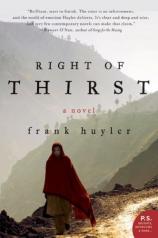Reading Group Guide
Discussion Questions
Right of Thirst

1. The protagonist, Charles Anderson, travels to an unnamed Islamic country on what he believes will be a redeeming humanitarian mission. Why do you think the country is unnamed? Why is Anderson's hometown similarly not identified? Why are specific geographical details withheld throughout the novel?
2. Is Anderson a good man? Are his intentions noble? Are they selfish? Does he himself know or fully understand the difference?
3. What is the relevance of the story to recent world events?
4. What is the relevance of the story to the American Dream? How have Anderson's values changed since he was a young man at the dinner party on the shore of Lake Michigan? Has experience brought him wisdom, and, if so, what has he learned?
5. One of the subtexts of the novel is that of genetics—Elise's study, or Anderson's reflection on the film about the ant burrows. What is the relevance of this theme to the larger events of the story? Is the author implying that we are at the mercy of our genes, that free will is impossible? Or, is he implying the opposite, that we are capable of rising above our basic natures when necessary?
6. Scott Coles is an admirable person on the one hand, and a flawed, foolish narcissist on the other. Is Charles Anderson any different? How much does self-knowledge matter in the end?
7. How is Sanjit Rai like Charles Anderson and/or Scott Coles? How do they differ? Why is Elise studying only the Y (male) chromosome, and what relevance does this fact have to the story? What do you think the author is saying about the world of men?
8. With the noteworthy exception of Homa's mother, the most honest characters in the story are women. What is the role of women and girls in the story? How do they differ from the male characters in the book?
9. Eric, Anderson's son, is an actor. What roles do each of the various main characters—Anderson, Rai, Coles, General Said—play throughout the story? How do these roles differ from their true selves?
10. There are many journeys in this story, some real, some allegorical. What larger purpose does the metaphor of the journey serve?
11. What does the novel seem to be saying about cultural differences? That we are essentially the same, or that there are profound, irreconcilable differences between us that will never be bridged?
12. Why does Anderson give Rai the money at the end? Who is he doing this for? What does this act say about Anderson, and about charity in general? Is it possible to be charitable and selfish at the same time?
Right of Thirst
- Publication Date: April 21, 2009
- Paperback: 355 pages
- Publisher: Harper Perennial
- ISBN-10: 0061687545
- ISBN-13: 9780061687549







